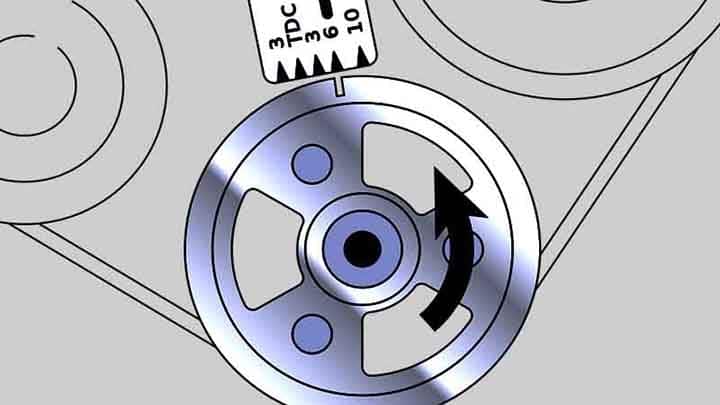Last Updated on May 11, 2023 by themechanic
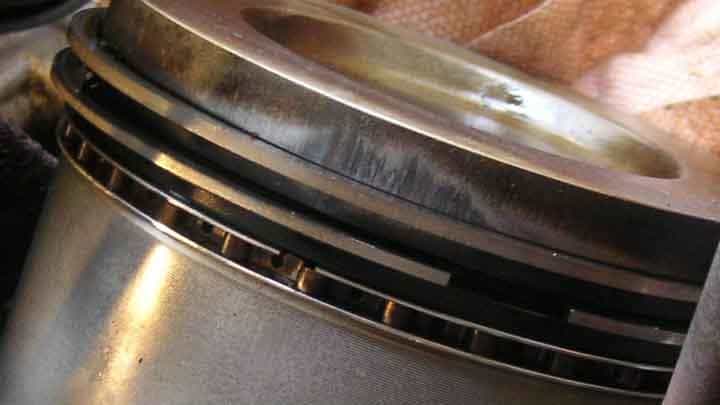
In this article, we will share information about one of engine parts called piston rings. After reading this article, you will know the symptoms of bad piston rings driving (with worn piston rings) and tips to diagnose and prevent it.
Basic Functions
The internal combustion engine of a vehicle is comprised of piston rings that surround the diameter of the pistons. There are 4 primary functions to piston rings:
- The first function is to seal the middle of the cylinder and piston after combustion. That way, the combustion gases do not leak out from there.
- The second function is to manage the oil lubrication for the moving pistons.
- The third function is to remove heat from the pistons so that it doesn’t damage the engine.
- Finally, the last function of piston rings is to ensure the piston does not knock against the cylinder wall.
As you can see, the piston rings play a vital role in the functionality of your vehicle’s engine. You cannot afford to have one of its functions go bad, let alone all of them. This could spell trouble for you as you’re driving your vehicle. Suddenly, you’ll experience an array of engine, oil, and overall vehicle performance problems. If you can understand these problems and where they come from, you can trace them back to bad piston rings.
5 Symptoms of Bad Piston Rings
The piston rings should stay vital for a very long time. However, like most parts in a vehicle, they will eventually become worn out. You will need to replace these components quickly, or your vehicle will face more severe damage. This damage will cost you thousands of dollars instead of hundreds of dollars. Therefore, it is essential to recognize the symptoms of lousy piston rings as they occur.
Below are the top 5 symptoms of bad and worn piston rings in your car.
1) Oil Leak in Combustion Chamber

Whenever you have worn out or damaged piston rings, they will leak oil from them. This oil will likely find its way into the internal combustion chamber. Once that happens, an abundance of oil will be consumed at a fast rate. To prevent too much engine heat from generating, you’ll need to add more oil to supplement the leaking oil. Of course, you should only do this to buy enough time to get your vehicle to the mechanic and have them fix the leak.
2) Poor Acceleration Performance
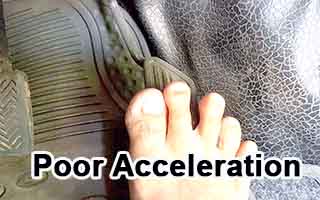
Damaged or worn piston rings will cause your engine power to diminish. You will notice this when you step on the gas pedal to try and accelerate your vehicle. Instead of going faster as you accelerate, there will be a delayed reaction to the acceleration. It may even take more than a few seconds before you start going a little bit faster. But you won’t go as fast as you’d like.
3) Excessive Exhaust Smoke
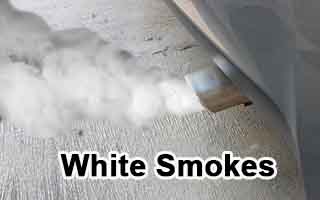
Bad piston rings can result in gray or white colored exhaust smoke coming out of your tailpipe. This is a result of the leaky oil burning inside the combustion chamber. It will be a very thick cloud of smoke that you can distinguish from any other type of exhaust smoke. If you see this smoke coming out, then you can blame it on bad piston rings.
4) No Acceleration
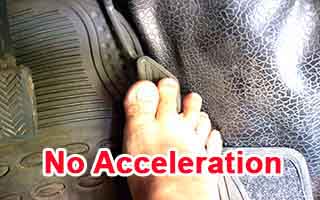
As the poor acceleration continues from having bad or worn piston rings, it will eventually become so bad that you won’t be able to accelerate at all. You will merely step on the gas pedal, and the vehicle just won’t be able to go over a certain speed. In some cases, it won’t be able to move at all, leaving your vehicle parked and stagnating.
5) Overheated Engine
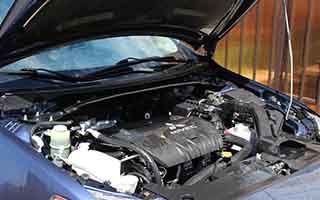
If you overlook the oil leak from having lousy piston rings, your engine will start to heat up. Remember that oil is what lubricates the engine and keeps its moving components cooled. If these components heat up too much, they will overheat the engine. This could cause permanent engine damage, the costliest problem you will ever need to fix.
Read also:
- 5 Causes of Steering Wheel Shakes at Low and High Speed
- 5 Causes of Car Steering Wheel Hard to Turn
- 5 Symptoms of a Bad Ignition Coil in Your Car
- 5 Best Oil Additives to Stop Car Engine Knocking
How Long Can I Drive My Car with Bad Piston Rings

Piston rings are located inside the internal combustion engine. If the piston rings ever go wrong in your vehicle, you need to think carefully about whether you should replace them or not. Piston ring replacement requires the engine to be disassembled, which is very complex and expensive. It is also hazardous because it is difficult to reassemble an engine back to its original settings. That is why you should only replace the piston rings if you have no choice.
If the piston rings are damaged rather than worn out, you need to replace them immediately. But if your piston rings are slowly wearing out, you may have some time to spare before you need to have them replaced. The first noticeable symptom of bad piston rings is the tailpipe’s white and gray exhaust smoke. That is a sign that engine oil is leaking through the piston rings and getting into the combustion chamber of one or more engine cylinders. The smoke is caused by the oil burning within the chamber during combustion.
Meanwhile, as the white and gray smoke emits from the tailpipe, more oil is consumed in the engine. But since there’s an oil leak, you’ll also have less oil in the engine. That’ll result in the engine overheating and possible damage to the components of the engine. This big problem must be addressed fast, or your engine could suffer irreparable damage.
Your vehicle may last for a couple of weeks if you simply keep changing your oil to accommodate the leak. However, your engine won’t be able to produce as much power as it did before. This will make it a driving hazard on the road, which puts people’s lives in danger.
Therefore, it is not worth waiting even a couple of weeks to replace your piston rings. As soon as you notice white and gray exhaust smoke, take your vehicle to the mechanic and have them investigate the source of the problem. If they determine that your piston rings are bad, then have them replaced immediately.
Tips to Diagnose Worn Piston Rings in Your Car
Piston rings are needed to manage the oil pressure within the engine. This determines how much oil passes through the engine, which is crucial for preventing the engine from overheating. If the piston rings in your car ever become worn out, then it could be devastating for your engine and its internal components.
Piston rings are not expensive to replace. But if you fail to replace them after a certain amount of time, you could have many more expenses on your hands where your engine is concerned. The replacement cost for a new engine is several thousand dollars. To avoid this outrageous expense, you must pay attention to the signs of worn-out piston rings.
Below are 3 essential tips for diagnosing worn-out piston rings in your car.
Check Engine Oil Consumption
In normal circumstances, you would have to change your engine oil every 3,000 to 5,000 miles. But if your oil is going bad a lot faster, you may have a problem with your piston rings. Bad engine oil is noticeable because your engine will start to overheat. As you know, oil lubricates the engine components, which contributes to keeping it cool. If the oil fails to do this under 3,000 miles, it could be a piston ring issue.
Check Exhaust Smokes
Do you see a lot of exhaust smoke emitting from the tailpipe? If so, does the smoke appear thick with gray and white colors? If you answered “yes” to each question, it could be linked to bad piston rings. The result of this is oil leakage running into the internal combustion chamber. When the oil gets burned, thick clouds of exhaust smoke are generated.
Check the Engine Power
Damaged or worn-out piston rings limit the amount of compression within the engine. As a result, the engine will take longer to generate power after you put your foot on the gas pedal. You must replace the piston rings to resolve the issue. Don’t let the problem continue for too long, or your car may not run.
Tips to Prevent
The only way to solve the piston rings problem is to change it. But the price often would make you want to break your credit card. So you should consider preventing the piston rings wore out.
- Only use the recommended engine oil. Some oil is too washy to your piston ring and its seals. It could initiate an oil leak. The different car has a different engine. They need specific oil that might be incompatible with another one.
- Change the oil and filters as recommended in your manual book. Usually, the book suggests you change those parts by distance or date. Write down the distance and date every time you change them, and the price if necessary. It could be practiced for the other components.
- Pull over and bring your vehicle to the mechanic as soon as you find out something wrong with your car, especially with your engine.


